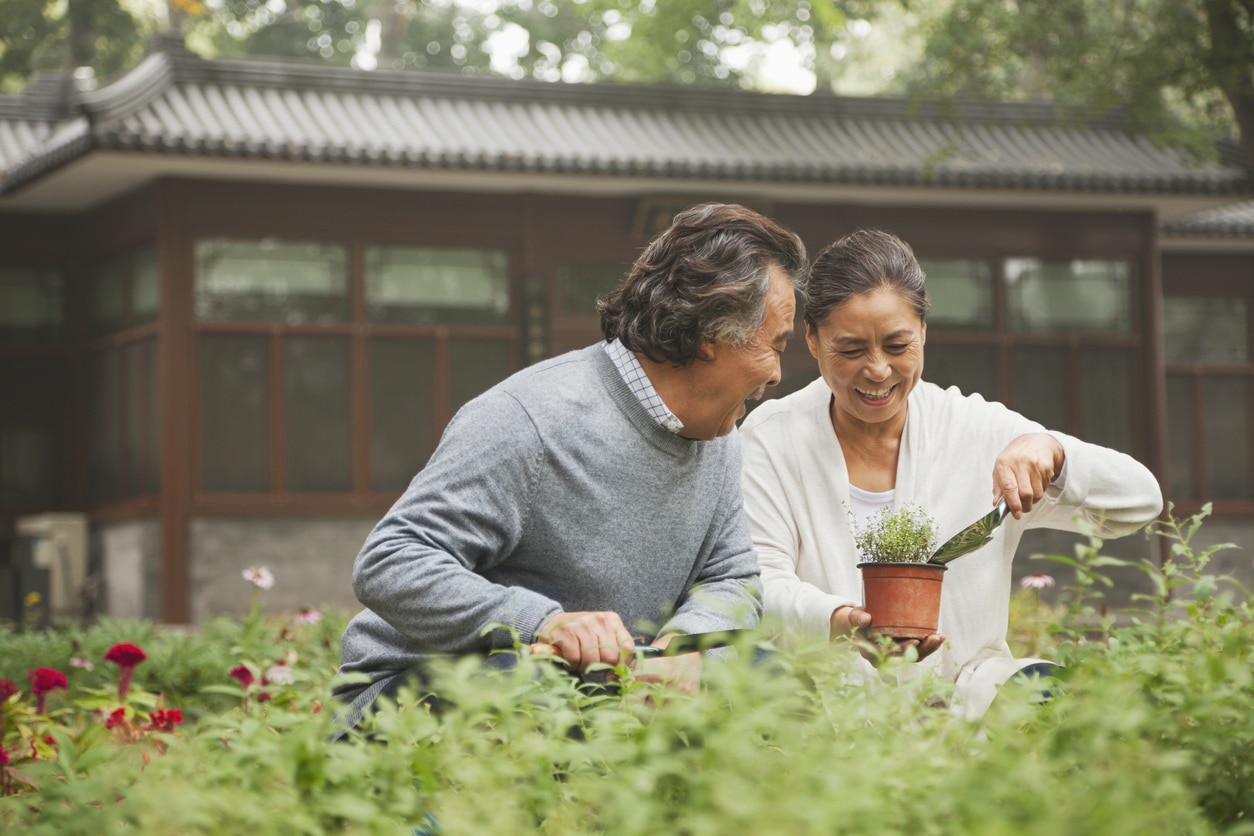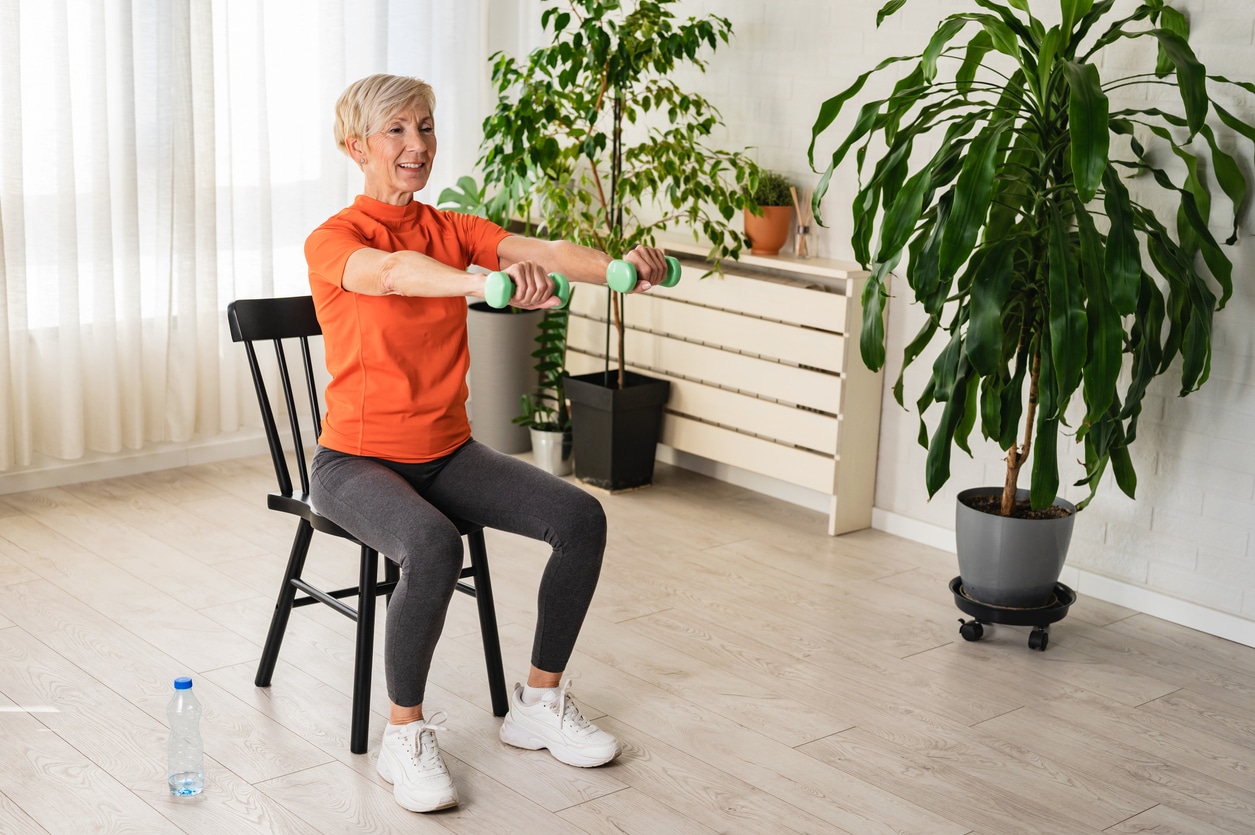Data from the CDC show that as little as 2.5 hours of active gardening each week can produce big health wins, including maintaining a healthy weight and avoiding conditions like high blood pressure and other cardiac issues, colon cancer, depression, osteoporosis, type 2 diabetes and even premature death.
Let’s dig into the ways gardening is good for you:
Physical Benefits of Gardening
“[Gardening] keeps the body strong and flexible, including both fine and gross motor skills – walking, standing tolerance, squatting, bending, manipulation of tools and plants,” explains Sally Haskett, horticultural therapy program manager at the North Carolina Botanical Garden in Chapel Hill, N.C. Active senior gardeners also experience lowered heart rates and better sleep from physical activity and contact with nature.
Fresh air and sunshine clear the senses from being indoors. Sally Morgan, a holistic physical therapist in Northampton, MA, explains that “Plants release oxygen into the air. Spending time near plants gives seniors improved oxygenation when makes us feel good.” And Italian researchers found that exposure to sunlight can boost serum vitamin D levels. This increases calcium, which is good for our bones and immune systems.
Benefits of Gardening for Mental & Cognitive Health
A landmark Australian study found that working in the garden daily produced a 36% reduction in dementia risk.
It can also improve our mental health. The emotional benefits of gardening include:
- Relaxation and Stress Reduction. “Gardens provide beautiful settings which uplift our hearts and improve our moods,” Haskett notes. “Even a view out a window, for example from a hospital bed, can lower the need for pain meds and fewer calls to nursing staff.” According to multiple studies, contact with nature “helps shift individuals toward a state of deep relaxation and parasympathetic activity, which counters the adverse effects of stress on energy metabolism, insulin secretion, and inflammatory pathways.”
- Self-Esteem. As we age, we can feel less vital. Working in the garden helps us avoid or mitigate that feeling by giving us a creative outlet. “Creative work builds self-esteem,” Haskett notes. The purposeful work with tangible, often beautiful results, is also critical, she says, “because all of us need to know our existence is meaningful.” Growing something –- especially vegetables and herbs for consumption – imparts a feeling of self-sufficiency, too.
- Connections. There are important social benefits of gardening, too. “Gardens bring seniors into a worldwide community of gardeners,” Morgan says. Whether it’s working together at a community plot or participating in related activities with others, gardening connects us to other living things (plants, people and wildlife). The friendships and camaraderie we develop with other gardeners help combat loneliness, isolation and depression.
Spiritual Benefits of Gardening
“Gardening connects us to nature, and as part of that, with the cycles of living and dying,” Morgan explains. “I have observed many seniors who are avid gardeners come to peaceful terms with their own mortality using the metaphor of the garden – the idea that there is a time to live and a time to die, and that death is not necessarily the end. Gardeners see how last season’s stems and leaves become compost and nourish next year’s garden to complete the circle of life. This can bring a sense of inner peace.”
Tips & Gardening Benefits for Seniors with…
Arthritis & Mobility Issues
Adapting the garden to your needs is the key to staying active with arthritis or limited mobility. Raised beds and container gardens keep you from having to kneel by enabling standing or seated work. Ditto vertical plants, long-handled tools and gardening stools or carts. Wide smooth paths make navigation easier for people using walkers, canes or wheelchairs. There are loads of tools on the market for gardeners with arthritic hands. The American Arthritis Association has more advice for gardening with arthritis and joint pain.
Alzheimer’s & Cognitive Disorders
Therapeutic gardening for seniors with cognitive issues can ease confusion, stimulate positive memories and feelings, encourage engagement with family and friends, and deliver physical health benefits. “Not only does it give a person a certain sense of autonomy being able to do things on their own, it increases circulation through repeated light exercise and movement,” notes Ronna Moore, owner of Fairy Homes and Gardens, in Savannah, MO. Avoid sharp tools to ensure safety, keep tasks simple to avoid frustration, and use small, enclosed spaces to discourage disorientation or wandering. Consider a medical alert system for an added layer of security for gardeners with Alzheimer’s and cognitive disorders.
Limited Mobility
Gardening doesn’t have to happen outside. Seniors who are unable to leave their homes can benefit from activities like propagating indoor plants or creating small terrariums and rock or sand gardens. Also beneficial, Haskett says: “Working with cut and dried fragrant and texturally interesting plants, such as milling lavender from a stem to make a sachet; or arranging fragrant flowers and ferns in a vase.”
Visual Impairment
For seniors with limited sight, Haskett suggests “working with herbs, other fragrant plants, and creating situations where the sense of smell and touch are stimulated. Taking a sensory nature walk – or push if in a wheelchair – to brush against fragrant herbs to touch and smell. Or digging in a raised garden bed, turning up the soil, smelling earth smells.”
No matter how you participate, you can reap the gardening benefits for older adults.
“Connection to nature is a connection to life itself,” Haskett concludes. “Just as children and animals provide positive connections to life for elders, gardens and plants do the same.”




